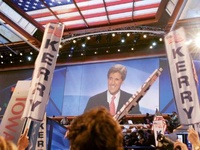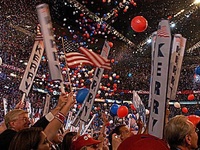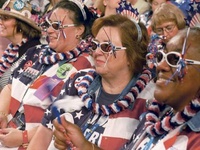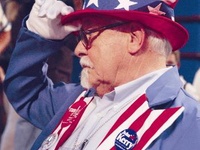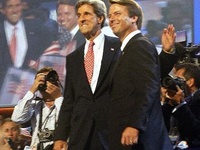
The Democratic National Convention, held this week in the FleetCenter in Boston, was capped off when Sen. John F. Kerry, D-Mass., accepted his party's nomination last night.
BOSTON—It was, by general consensus, the most important speech of John F. Kerry’s life.
Speaking to an over-capacity audience of loyal Democrats in the FleetCenter, the Massachusetts senator arrived on stage to accept his party’s nomination for president. But his words were aimed further than the delegates assembled on the floor.
As millions more watched the climax of the four-day Democratic National Convention (DNC) broadcast on television, Kerry was also making his case—“help is on the way”—to the undecided voters who may well determine the outcome of the Nov. 2 presidential election.
The nearly hour-long speech was in many ways familiar from stump speeches he delivered over the past year in a heated primary campaign. But in an effort to bring new life to his White House bid, Kerry also incorporated new themes—including, early in his speech, a call to arms for the cause of women’s rights—and responded in unusually blunt fashion to criticisms of his policies and style that have accumulated over the course of his run.
And after three days in which mentioning the name “Bush”—let alone openly attacking the current administration—was strongly discouraged, Kerry proved himself unafraid to address the president directly and aggressively.
While the FleetCenter’s floor was erupting in applause and campaign signs, Harvard students watching the speech from the John F. Kennedy Jr. Forum at the Institute of Politics overwhelmingly embraced Kerry’s leaner, meaner message.
“I was impressed by his tone—he didn’t sound too uptight,” Y. Edo Paz ’05 said. “He succeeded in having a truly personal demeanor.... I was impressed that he was able to pull off the most impressive speech of the convention after the great speeches of [former president Bill] Clinton on Monday and [Illinois senatorial candidate Barack] Obama on Tuesday.”
Felipe C.L. Velasquez ’05 was similarly impressed that Kerry could still hit home after four days of buildup.
“I like how he was able to come off as the flagship of the Democratic Party,” Velasquez said. “That’s not easy with so many other luminaries.”
From the first words of his 10 p.m. keynote speech—a gruff “Reporting for duty!”—Kerry emphasized what has been a defining theme of the convention and his campaign thus far. Alluding repeatedly to his now-familiar personal narrative that included service on a boat in the Mekong River during the Vietnam War—and his subsequent opposition to the unjust war that it contributed to—Kerry portrayed himself as a principled war hero wary of the dangers of armed conflict.
“I know what kids go through when they are carrying an M-16 in a dangerous place and they can’t tell friend from foe,” Kerry said. “I know what they go through when they’re out on patrol at night and they don’t know what’s coming around the next bend. I know what it’s like to write letters home telling your family that everything’s all right when you’re not sure that’s true.”
In a more fiery version of what has become one of his trademark moves, Kerry used his Vietnam experience as a platform on which to attack President Bush.
“I will be a commander in chief who will never mislead us into war,” Kerry said, going on to criticize the rest of the Bush administration in equally harsh terms, though just short of explicitly. “I will have a vice president who will not conduct secret meetings with polluters to rewrite our environmental laws. I will have a secretary of defense who will listen to the best advice of our military leaders. And I will appoint an attorney general who actually upholds the Constitution of the United States.”
And striking a chord usually reserved for those further to the left than Kerry has portrayed himself during the campaign, the senator issued a scathing critique of Bush’s energy policy and diplomacy.
“I want an America that relies on its own ingenuity and innovation—not the Saudi royal family,” he said.
Read more in News
Mahan Unveils New Harvard-Yale Game Plan








